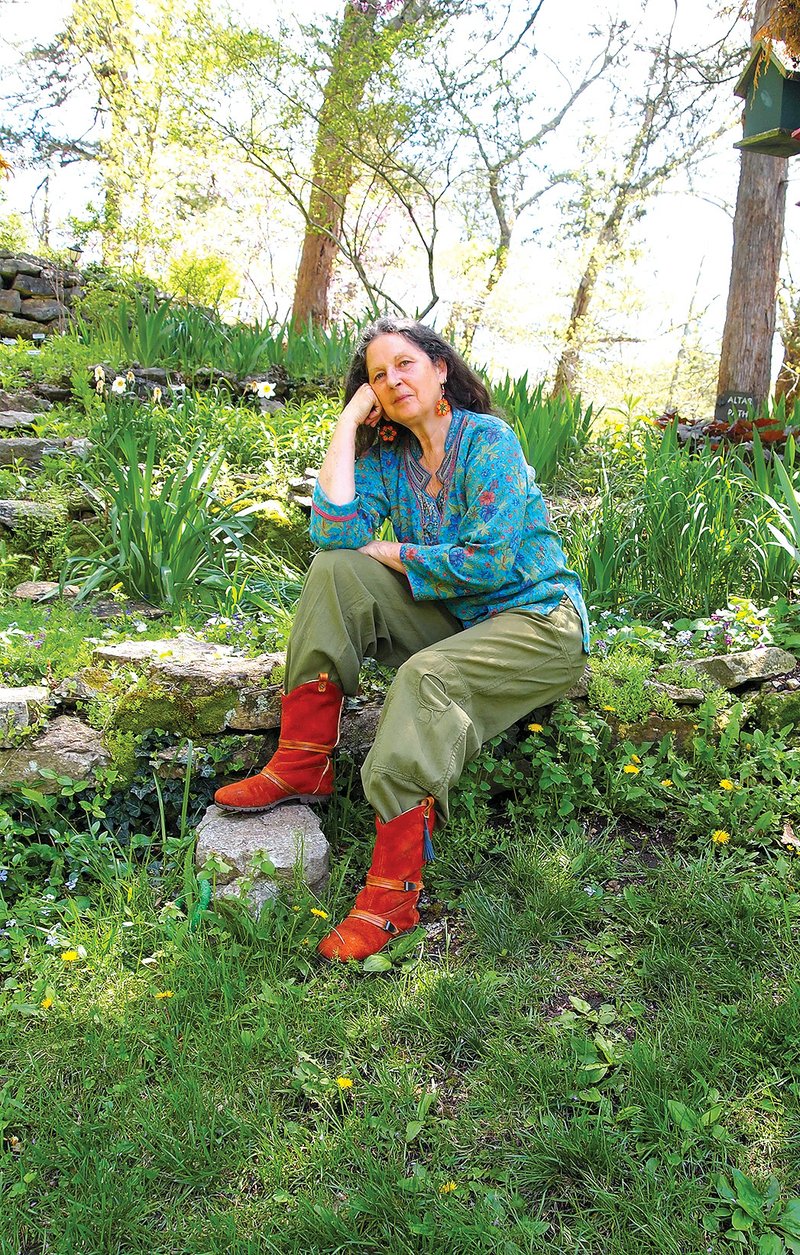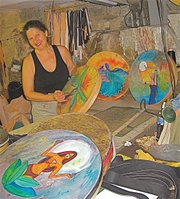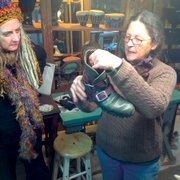"A human being should be able to change a diaper, plan an invasion, butcher a hog, conn a ship, design a building, write a sonnet, balance accounts, build a wall, set a bone, comfort the dying, take orders, give orders, cooperate, act alone, solve equations, analyze a new problem, pitch manure, program a computer, cook a tasty meal, fight efficiently, die gallantly. Specialization is for insects!"
-- "Time Enough for Love"
Fast Facts
Herbs & Botanical Weekend
When: Saturday and Sunday
Where: Fire Om Earth Retreat Center & Art Studio in Eureka Springs
Cost: $35 for the morning or afternoon session; $120 for all four sessions
Information: fireomearth.com
Go & Do
‘Women of Substance:
A One-Woman Show’
When: 6-9 p.m. April 30; 4-9 p.m. May 1; noon-9 p.m. May 2
Where: Caribe Restaurant & Cantina in Eureka Springs
Cost: Admission is free; works will be for sale
Information: fireomearth.com
By Robert Heinlein
No one who knows Lorna Trigg would be surprised to think she could do all of those things. Friends and acquaintances, apprentices and proteges, know this Renaissance woman can craft a pair of boots, raise a yurt, formulate an herbal tincture to ease pain or illness, sculpt a statue, build a business and, perhaps most important of all, create a community around the needs of its members.
"I've always thought of Lorna as a rare breed of creative, artistic energy that understands business and how it works," says Janet Alexander, a Eureka Springs artist, actress and director with whom Trigg has collaborated on recent projects. "It's a truly admirable trait -- and indicative of a beautiful mind."
"She feels like I've taught her a lot, but I always look at it as a shared experience," says Jim TwoFeathers, a Muscogee Creek and Cherokee medicine man. "She is this incredible organizer who can get things done and work hard and really has a tendency to be able to bring people together like a bridge. And then there's a spiritual side of her. When you can get past the doer, a special thing happens, and there is sacred space between people."
Right now, Trigg is focused on the upcoming Herbs and Botanical Weekend she'll host Saturday and Sunday at her home, 15 acres on the edge of Eureka Springs she calls Fire Om Earth. Guests will include herbalist and photographer Steven Foster; Larry Lowman, Arkansas native plant preservationist; Melissa Clare, a plant spirit medicine practitioner; and D'Coda, a "granny woman" who just might be what Trigg wants to be when she grows up.
"I think granny women are born with it," Trigg says. "I feel little tiny coming-on bits of granny woman in myself. I aspire to have that knowledge and be able to share it. I hope I can be a wise elder."
Worlds away
Trigg's story starts in South Africa, where her British and Dutch grandparents helped shape her world.
"It made for two totally different ways of thinking," she says. "The British were very proper, entrepreneurial, and the Dutch were farmers."
Trigg's parents -- her father "an artist, creator, inventor, always making and fixing and doing" and her mother "very domestic" -- were still among the early generations of their families in South Africa.
"My mother's mother was a mail order bride," she recounts. "She got on a ship, lined up on the wharf and was handpicked by her husband. My great-grandfather on my dad's side had married a German Jewish woman, and they escaped to South Africa."
If Trigg's mother had had her way, Lorna would have been in the house with her, learning the proper way to do things. Instead, she was in the shop with her father or communing with the native people.
"At lunchtime, the maids would gather in the courtyard and eat together. And after I got my little sandwich, cut into triangles with the crusts trimmed off, I would sit in circle with these women," she remembers. "My mother was mortified. But I learned about women's ways from sitting in circle with these women."
In the country, visiting the Dutch grandparents, "the little tribal boys were the first to teach me herbal medicine," Trigg continues. "They knew about 200 medicinal herbs by the time they were about 8 years old. I had a medicine bag from the time I was 8.
"Schools were segregated, boys and girls -- and of course, no native children went to white schools," she adds. "I had already decided which side of the fence I was on. The indigenous people were very connected to the earth -- it was much more real to me."
Trigg studied dance from the age of 5, "but I didn't have the body of a ballerina, and I didn't like being on stage alone." Instead, she enrolled in college as an art student -- and then used what she learned to help the indigenous people she so respected.
"In Africa, most men go off to work in the mines, and the women raise the children," she explains. By taking art projects to those women, she found a way to let them earn some money for themselves. Their creations -- beadwork, baskets, rugs, pottery -- sold well to tourists, and the women became not only artisans but partners in the business. Eventually, the trust Trigg earned in working with them enabled her to import their handicrafts into the United States and send even more money back to them.
But that's getting ahead of the story.
Too dangerous
What one might call Trigg's personal life was more complicated. She had married "very young," had two children and divorced "very young." "We were just a total disaster together," she says of her first husband.
That meant Trigg raised her children on her own for seven years before she met an American studying for his Ph.D. They married and had a daughter, Kadi, "then he decided he didn't want to be in South Africa."
Trigg did not accompany him back to the United States, but it wasn't long before she began to question her decision.
"South Africa was getting incredibly dangerous," she says, as the fight against apartheid surged into war. "Friends were having their houses raided and being detained without trial. You never went to a big gathering because there might very likely be a bomb. I just stopped dead when a friend disappeared. I knew it was too dangerous to keep my kids there.
"Since I was still married to an American, I was able to come over to the United States in 1988. I felt like a traitor, but it was so incredibly dangerous," she says again, a tiny shudder passing through her. "We landed in Buffalo, N.Y., because he was there. And I was there for 16 years."
That's where Trigg discovered that she could help the people of South Africa even from thousands of miles away.
"South Africa was the flavor of the day," she says, and everyone wanted to buy products made there. Native women she knew sent over a 9-foot container filled with their crafts, and Trigg found herself the proprietor of a store. "And it was just incredible."
Along the way she met Craig Hirsch, a master wind instrument builder, and they fell in love.
"Craig had a daughter, Olivia, a year younger than Kadi, and when they were finishing high school, we decided we were going to go find the perfect place to live, an art community," Trigg remembers. "Craig had been in Eureka Springs in the 1970s, so we thought we'd go see what was happening there. We found this place the first day."
Fire Om Earth
That was in 2002. The couple bought the property "but had no idea what we wanted to do with it."
"Two years before, I had been to a women's retreat on a friend's property, and my vision board was an art community with an ocean or woods, a small house with covered porches and a big art studio," Trigg remembers. "This house is actually four log cabins with three levels of studios and a small living space. When I walked on this land, it was totally wrecked, but it told me what it needs to be -- to be shared, to be for community."
After research and application, Trigg and Hirsch were awarded a grant from the Arkansas Native Plant Society to restore the woodlands, "which means they give you some money and you work like hell," she says. The property was declared a botanical sanctuary -- but it became a sanctuary for humans, too.
"People find what they're looking for," she says. "There is an influence here that allows people to be who they are or find what it is they need -- sometimes through wise men and women, sometimes just through the land itself.
"People show up here -- teachers, or people who need to retreat."
For some time, Trigg hosted new moon events where women could come together as indigenous women did during their menses. From those gatherings was born the idea of the Red Tent Sisters, an organization new to Eureka Springs but not in other communities around the world. The "sisterhood" wanted to build a safe place for women, and during the first of the group's gatherings, Trigg envisioned "a freakin' big yurt" at Fire Om Earth. Incredibly, one of the women, Marcie Brewster, said she had one she'd donate. Trigg knew the exact spot, "a space across the creek on the hill where I built my first sweat lodge. It's always been a women's gathering place."
But the project would take money. The group raised $2,500 in a two-day yard sale but needed more. Wouldn't it be great to present "The Vagina Monologues," someone wondered. And in the kind of magic that always seems to happen around Trigg, she realized Janet Alexander, the director of the production in Eureka Springs in 2005, was in her bootmaking class.
"We had auditions two days later," Trigg says, and the March 21 performance sold out the Eureka Springs City Auditorium, making enough to raise the yurt and donate to the Carroll County Safety Network, a 24/7 domestic violence crisis hotline, and the Purple Flower, a domestic violence resource center.
Alexander describes Trigg's gift to the women of Carroll County as "that mind of hers, that fully aware, empathic, creative mind which has the ability to instinctively find solutions to problems and then the ability to create pathways to make those solutions work. She is one of the most balanced, positively aware humans I've ever encountered. She has no guile, no pretense, no need to manipulate and no care to be anything but herself."
Living legacy
Everyone who works with Trigg on any of her endeavors praises her in equally powerful words.
"Tenacious. Directed. Balanced," says Marcie Brewster, the donor of the yurt. "Our tribe mother," says Phyllis Moraga, one of the Red Tent Sisters and an actress in "The Vagina Monologues." "A subtly complex treasure," says Jillian Guthrie, a Eureka Springs therapist who also appeared in "The Vagina Monologues." "Creative, progressive organizer," says Eureka Springs artist Zeek Taylor.
Maureen Dailey, also an artist, says "Lorna has raised my bar for my integrity, my word, my responsibility to myself and to my community. If you say 'yes' to Lorna, she expects you to mean it. She is a task master in that beautiful way. She makes you be your best."
Trigg seems to hold herself to the same standard. Sitting on her back porch, surrounded by flowers, prayer bells and birdsong, Trigg says she insists on taking time every day to get in touch with her spirituality and her land.
"I feel the ancestors on this land. I want to create ceremony and ritual so we come to that place of gratitude here."
Dailey already has.
"I am more complete from knowing her. Lorna sees in you potential you don't dare open your eyes to. I have a handful of women in my life who see me. Lorna sees. Lorna is authentic, one of the few, for better or worse."
"I never really had a plan," Trigg says. "Things come my way, and if they really resonate with me, I run with it. And what I seem to do best is connect with women.
"Really, it all has to do with coming back to yourself."
NAN Our Town on 04/23/2015



